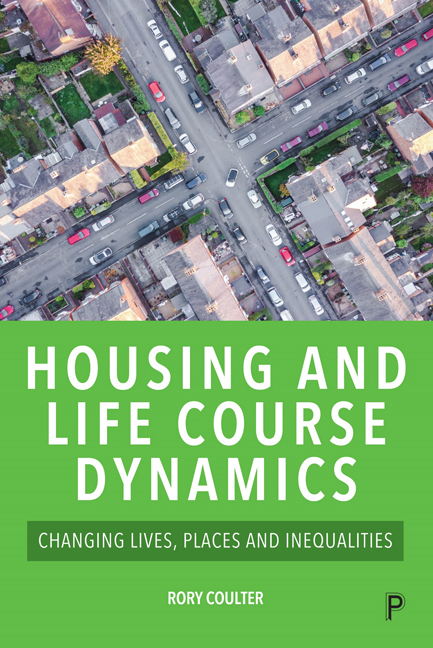Book contents
- Frontmatter
- Dedication
- Contents
- List of figures and tables
- List of abbreviations
- Notes on the author
- Acknowledgements
- Preface
- 1 Introduction
- 2 Housing: a life course perspective
- 3 Households and families
- 4 Learning and training
- 5 Employment and money
- 6 Health, well-being and care
- 7 Changing places
- 8 Understanding housing and life course dynamics
- Notes
- References
- Index
4 - Learning and training
Published online by Cambridge University Press: 18 January 2024
- Frontmatter
- Dedication
- Contents
- List of figures and tables
- List of abbreviations
- Notes on the author
- Acknowledgements
- Preface
- 1 Introduction
- 2 Housing: a life course perspective
- 3 Households and families
- 4 Learning and training
- 5 Employment and money
- 6 Health, well-being and care
- 7 Changing places
- 8 Understanding housing and life course dynamics
- Notes
- References
- Index
Summary
Learning and training are central topics in life course research as variations in educational participation, pathways and attainments form an important axis of social inequality. In contrast, housing scholarship often considers education to only be crucial to a specific set of residential processes, such as long-distance migration or neighbourhood dynamics around university campuses. While qualification variables are almost always used when modelling residential behaviour, these are typically treated as controls or are instead interpreted as proxy measures of resources or lifestyle preferences. Surprisingly little attention has thus been devoted to understanding how changes in education and housing systems interact to alter lives, places and patterns of inequality.
The post-war transformation of education is one arena where public policy has had particularly potent impacts on the structure of life courses. Since the Second World War, Global North education systems have expanded as compulsory schooling has been prolonged and become less selective, vocational training pathways have been formalised and participation in higher education (HE) has grown and widened to formerly excluded populations (for instance women, the less affluent and ethnic minorities). This transformation of extended education into a mass activity has altered residential careers by changing the type and timing of life events while also altering aggregate patterns of housing preference, resources and restrictions. Crucially housing has, in turn, become an influential determinant of educational success as where families live often has an impact on the quality of the schooling their children receive (Piekut, 2021).
This chapter uses life course perspectives to examine these two-way connections between education and housing dynamics. It argues that understanding how education interacts with housing processes requires recognising that:
• Education is not just relevant to housing in early adulthood but rather matters over the entire life span.
• Education is not just about measurable qualifications but is also a biographical process of gaining competencies, skills and knowledge about subjects, activities and places while developing new perspectives, worldviews, peer groups and tastes.
• Educational qualifications are, to an extent, positional goods as their economic value is inversely related to their prevalence, while the disadvantages of not possessing a given qualification increase the more ubiquitous it becomes (Green, 2017).
- Type
- Chapter
- Information
- Housing and Life Course DynamicsChanging Lives, Places and Inequalities, pp. 76 - 96Publisher: Bristol University PressPrint publication year: 2023

